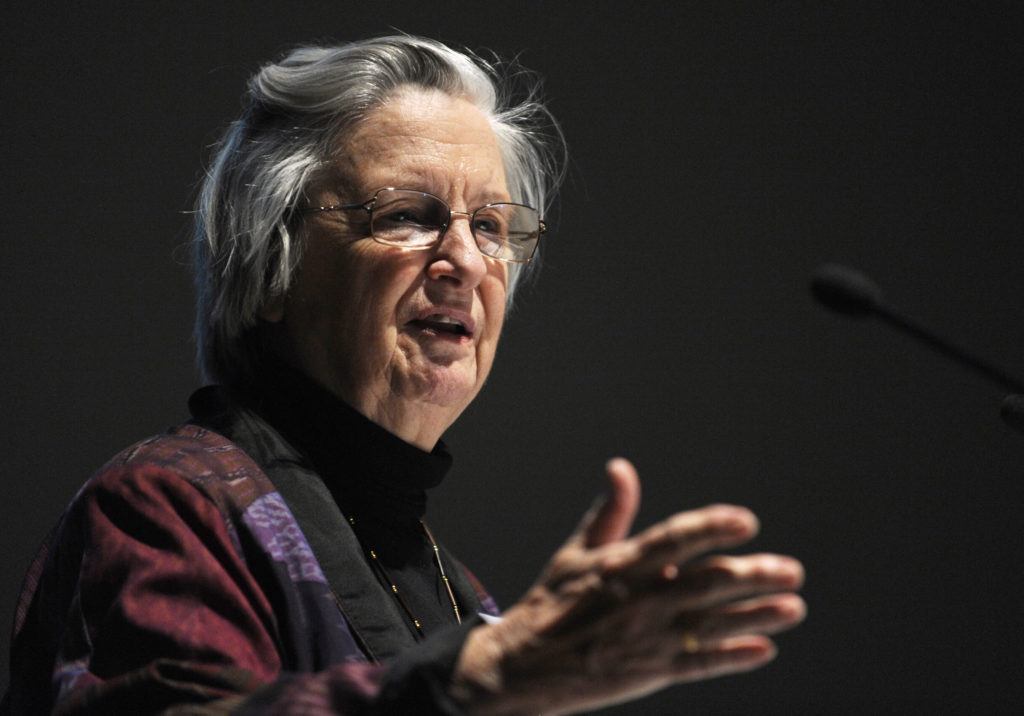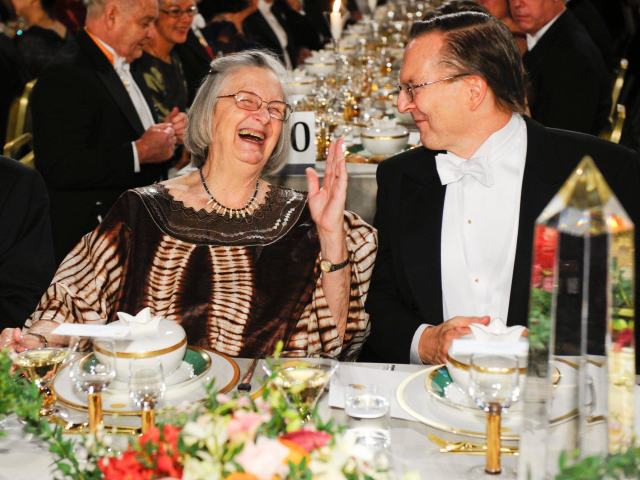Elinor Ostrom at the 2009 Nobel banquet in Stockholm, the year she won the Economic Prize. – Credit: Claudio Bresciani / Scanpix/ TT News/PA Images
A third entry to our Free Minds series.
I hesitate to tell you that my chosen ‘free mind’ is the first and only woman to win the Nobel Prize in Economics, because while that is undoubtedly a barrier-breaking achievement (see Victoria Bateman on why economics has a women problem), it is not why she gets my nomination. Her work, and the approach she took to it, explains that. But it does tell us something about the mindset of my maverick: she won the highest prize in economics as a political scientist even though as a young girl she had been dissuaded from studying maths.[1. .‘Elinor Ostrom’, The Economist, 30 June 2012; Ostrom shared the 2009 Nobel Prize with Oliver E. Williamson, a University of California economist]
Elinor Ostrom, political scientist and Nobel laureate, fundamentally changed the way we think about environmental governance and human behaviour. And in the process showed us that to understand economics, you have to understand people.
In 1968, ecologist and philosopher Garrett Hardin, popularised the idea of the ‘tragedy of the commons’. The theory claims that uncontrolled access to common pool resources, for example fisheries and forests, inevitably leads to over-exploitation, and therefore their depletion. To prevent this, Hardin argued, either government must intervene by controlling or regulating their use, or the resources must be privatised.
It is a dark assessment of human nature, one in which unfettered greed, and associated violence, cannot be tamed without formal laws and structures – and one which became mainstream belief.

Elinor Ostrom, however, inspired by her initial PhD study of water management in California, rejected this Hobbesian view of human nature. She rejected the binary state-private choice, instead proving through empirical research that communities can organise themselves to manage communal resources.
Ostrom showed that communities are more than capable of self-regulating their use of ‘the commons’, by creating their own governance institutions, and defining their own rules. And that conversely, private and public institutions can lead to the very degradation of resources that Hardin feared.
In demonstrating this, as one London School of Economics paper on the work of the Nobel laureate puts it, Ostrom “defined a field of research, and radically changed understandings”.[2. Tim Forsyth and Craig Johnson, Elinor Ostrom’s legacy: governing the commons, and the rational choice controversy, London School of Economics, August 2014] Research that her (and her husband’s) Indiana University Workshop in Political Theory and Policy Analysis continues to undertake.
Ostrom – and this is key – was not saying that decentralised, community-organised solutions always produce the best models for managing resources. She recognised that in some communities, state and private institutions may well be better approaches, particularly where resource boundaries are hard to define or where communities are more transient and therefore lack the social capital required for collective action. In fact, she identified many successful models of management that involve mixed regimes. But her presumption, well evidenced, was in favour of bottom-up, not top-down. She championed polycentric systems of government, that is multiple governing authorities at different levels, which she argued are far less open to capture by vested interests.
It is exactly this flexible approach that makes Ostrom’s work so important. She may have enabled the creation of theoretic frameworks, but Governing the commons, her seminal 1990 book, is no theoretical treatise. She was not taking an ideological stance. As Kings College London professor Mark Pennington, notes: “Throughout her career Elinor Ostrom was keen to avoid crude ideological labelling”, instead “chart[ing] an intellectual course avoiding conventional left versus right confrontations”. Which explains why both left and right lay claim to her ‘philosophy’.
It was through actually observing communities that Ostrom felled the “tragedy of the commons”. The scope of her fieldwork was remarkable: she studied urban and rural communities across the world, from Nigeria to Japan, Mexico to Switzerland, Poland to Australia. As well as, of course, her home nation America.
It was this approach, as much as her findings, that set her aside from her peers. Free minds are nothing if not open minds. To truly challenge conventional wisdom, you have to be willing to question and learn. That is precisely how Ostrom worked. Reflecting on the Nobel laureate’s life, academic peers from Princeton and Stanford described her as “fearless about venturing into new methodologies”, Ostrom “revelled in what she could learn from the very best people that she could find in one after another field”.[3. Kenneth Arrow, Robert Keohane and Simon Levin, ‘Elinor Ostrom: An uncommon woman for the commons’, Proceedings of the National Academy of Sciences of the United States of America, August 2012]
Her courage, in the face of accepted norms and prejudices, to think and work differently has led not just to new theoretical frameworks and academic research, but to real-life impact. Her insights have been applied in a multitude of settings and to a plethora of problems, including climate change, international development and public governance. I can’t help wondering if her approach to human behaviour – that to understand it you have to observe it first-hand – had been adopted more broadly by economists and political scientists, we might have better understood, even predicted, the upheavals of recent years.









Join the discussion
Join like minded readers that support our journalism by becoming a paid subscriber
To join the discussion in the comments, become a paid subscriber.
Join like minded readers that support our journalism, read unlimited articles and enjoy other subscriber-only benefits.
Subscribe